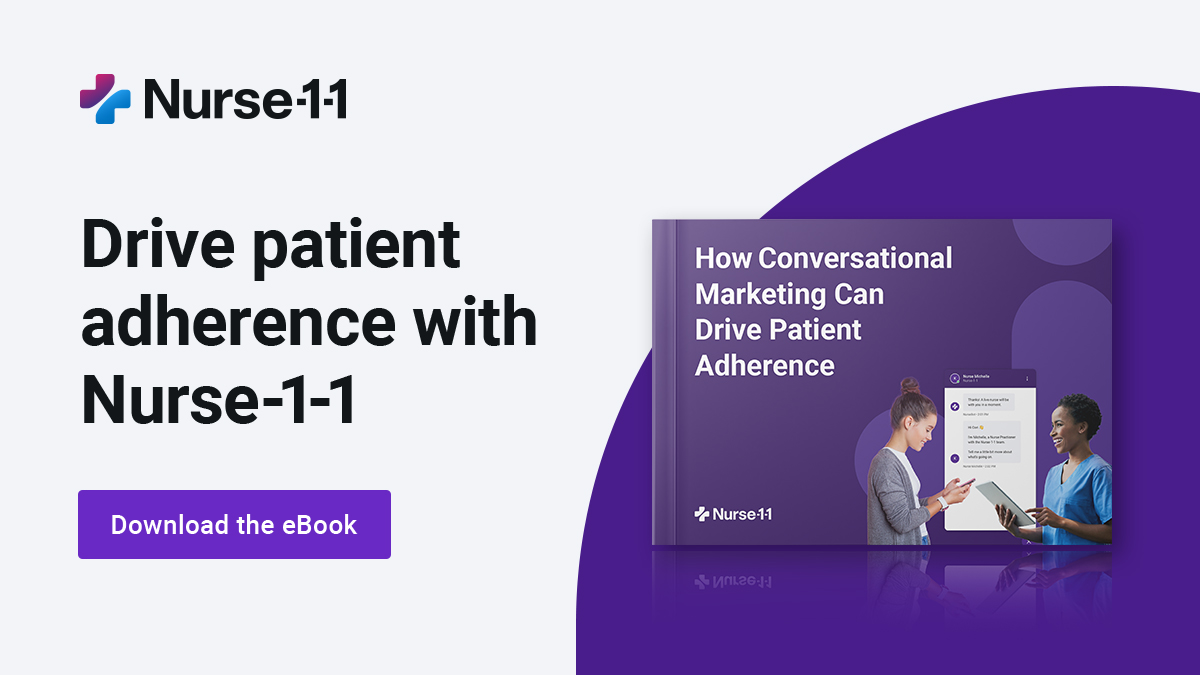Digital health platforms can combine the power of live chat with the human touch of professional nurses to keep up with rapid digital advancement.
Healthcare needs innovation – and it needs it right now.
Effects of the COVID-19 pandemic overhauled every industry – retail, banking and yes, even healthcare. The pandemic rapidly accelerated the growing trend of businesses and providers interacting with end-users through digital and online platforms.
Other industries adapted. It became easier and more common to order groceries through your smartphone, return packages online and handle banking with a virtual assistant.
Healthcare transformation has lagged behind, because it’s not quite like these other industries. Even a routine treatment like an at-home test includes touchpoints with a primary care physician, insurance agent, pharmacy, testing clinic, specialists and support staff. Patients need more support to navigate digital health and online pharma, but those helpful human resources haven’t been integrated into the remote health system as quickly.
Something must be done. Despite its unique complexity, could healthcare emulate the trends of other industries to deliver consistent, quality care in a remote world?
We know the answer is a resounding “yes.”
One possible solution is the addition of conversational marketing tools, such as a nurse live chat, to help deliver a personal touch to patients amidst a digital health experience. Digital health and online pharma platforms have reported a 57% increase in patient adherence after implementing Nurse-1-1’s conversational marketing product.
To understand the effectiveness of conversational marketing, let’s look at the state of healthcare and analyze where this tool can make an impact:
What is Healthcare Transformation?
It’s important to note that the transition to digital health and online pharma is a positive shift for patients. More people, including those in “healthcare deserts,” have access to care through their computers or smartphone. Telehealth and digital access are also more convenient, enabling “hospital-at-home” care that can ultimately relieve pressure from hospitals and inpatient facilities.
Access and convenience are on the rise. Where we need to improve is delivering the same quality and consistency that patients are accustomed to receiving in person.
Three trends have defined that challenge:
Rapid digital transformation has created more questions than answers.
Healthcare transformation – the transition to online and digital care – simply happened too fast for the complicated healthcare industry to keep up. Telehealth, for example, experienced a 38x increase in appointments per McKinsey, but it simply was impossible to complement those visits with 38x the supplemental resources in the same timeframe.
A lack of human touch has decreased the quality and consistency of online care.
Think of all the human touchpoints in a pre-pandemic healthcare journey: a conversation with a pharmacist at the counter or a reassuring tip from a nurse practitioner in the waiting room. Those touchpoints are vanishing with online care, leaving patients with unanswered questions like why is this treatment important? or what’s the best way to take my prescribed medication?
Non-adherence to medication and treatment is reducing positive healthcare incomes.
Without these personal touchpoints, patients might get lost in the steps toward the best healthcare decisions. Patients may need to log into their provider’s platform, then jump to an online pharma portal, then to another website, etc. It’s harder than ever to follow through with the right treatments.
How to Accelerate Healthcare Transformation with Conversational Marketing
Conversational marketing represents an ideal way to embed real-time communication and a human touch into the digital health journey. It’s a form of digital innovation that can promote positive healthcare transformation.
What is conversational marketing?
Conversational marketing is the method of providing support for customers and patients through real-time, one-on-one interactions. A common example is a live chat feature embedded in a website.
You’ve likely used a chat function for a consumer product or technology solution. We like it because it’s accessible, fast, intuitive and delivers information while we’re already thinking about the product or service.
How do we apply conversational marketing to healthcare?
In the context of healthcare, conversational marketing can take the form of a live chat platform that connects patients with professional nurses.
Patients can get the instant information they need (from a human medical professional) to make the best healthcare decisions – while they’re already within the digital health or online pharma platform. This isn’t meant to replace a visit with a doctor, and nurses aren’t meant to provide medical advice. Rather, a conversational marketing tool is a way to fill the gaps between individual patient research (Googling on their own) and clinical care – providing empathy, compassion and information to patients looking for guidance along their healthcare journey.
The Future of Healthcare Transformation
Think back to the major challenges of modern healthcare: a lack of resources to complement the digital experience, fewer personal touchpoints and rising non-adherence. A conversational marketing platform that connects patients and nurses has the potential to alleviate symptoms from all three.
Nurse-1-1 is a HIPAA-compliant, complete customer service platform built specifically for digital health and online pharma platforms. Our live nurse chat solution promotes proper adherence, improves patient education, and increases patient activation and provider-patient communication. The Nurse-1-1 service connects patients with Nurse-1-1’s nationwide network of 2,500 NPs, RNs, PAs, and MDs.
Here’s how we view Nurse-1-1 for digital health and online pharma:
Nurses (care & expertise) + Live Chat (tech-first, patient-centric approach) = Better health outcomes for patients
Healthcare transformation will only continue, and new innovation is the best remedy. A conversational marketing platform like Nurse-1-1 represents a way to continue adapting and bolstering digital tools with the resources that patients need.
